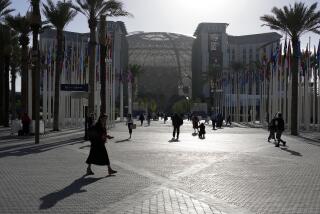Money in Doubt for Conference’s Action Plan : Beijing: Governments promise programs for women, but tight budgets could stymie efforts.
- Share via
BEIJING — There was a lot of talk this week at the world’s largest women’s conference. But after days of haggling over the wording of the “Platform for Action,” will there ultimately be any action? And who will pay for it?
“Without specific commitments and specific resources, we might as well go to see the Great Wall,” said Mona Zulficar, a delegate from Egypt. “Why bother staying here?”
On the final day of the U.N. Fourth World Conference on Women, as thousands of delegates prepared to bring home the meeting’s final product--the half-inch-thick Platform for Action detailing new initiatives to advance women’s status--many are wondering how the ambitious programs will be implemented. Developing nations say they do not have the money to pay for new programs, and developed nations are tightening their own belts.
“We have a document 360 paragraphs long with no mention of resources,” said Sally Ethelston of the Washington-based Population Action International.
Among the aims of the Platform for Action are the eradication of poverty, the increase and improvement of education for girls, and universal health care for women.
Government leaders say that there is not much chance of finding new funding for these lofty goals, so juggling existing budgets is the key.
“There’s a lot that can be done with a political mandate and no money,” said Armeane Choksi, a vice president at the World Bank.
*
But while governments waffle, grass-roots groups are pressuring them to fulfill promises made in speeches this week. So far, about 65 countries have announced actions designed to improve the lives of women, from promises as basic as Namibia’s guarantee of drinkable water for most rural areas by the end of the century to Singapore’s plan to offer home economics courses to male students.
Missing from the long list of commitments are price tags. At the 1992 U.N. Conference on Environment and Development in Rio de Janeiro, countries attached dollar figures to proposed programs, and regret doing so now that cash is harder to come by. Commitments made in Rio, if fulfilled, would cost $625 billion a year, an Asian Development Bank spokesman said.
The United States put forward the largest immediate initiative in Beijing, announcing Justice Department plans to spend $1.6 billion over six years to combat domestic violence and other crimes against women. The White House will also create a special task force--most likely headed by the U.S. delegation to the Beijing conference--to implement the Platform for Action.
Although the money for the anti-violence-against-women campaign was previously allocated under the 1994 crime bill, the White House created a follow-up group especially for the conference.
Women will be watching for results. “We’re turning this into a conference of commitment,” said Bella Abzug, the prominent U.S. feminist. “Action is the name of the game.”
*
Abzug’s group, Women’s Environment and Development Organization, or WEDO, is compiling a list of every new program mentioned this week.
In collaboration with the Assn. for Progressive Communications, it will post a “Beyond Beijing” scoreboard on the Internet to track action and keep pressure on leaders to follow up.
“It’s up to the non-governmental organizations to keep the governments honest,” said Susan Davis, executive director of WEDO.
Written into the Platform for Action is a requirement that leaders meet with their countries’ non-governmental organizations before the end of next year to map out national plans of action.
But despite their avowed commitment to women’s equal rights, many countries say they will find it hard to follow through on the conference’s recommendations without help.
“The advanced countries are generous with words and principles but stingy with resources,” said Sudanese delegate Ahmed Abdel Halim, tapping his snakeskin slipper impatiently. “There is an attempt to saddle developing nations with obligations they can’t fulfill.”
International organizations that many countries depend on to help pay for new programs are also under pressure, experiencing “donor fatigue” as well as their own funding cutbacks.
*
While the World Bank announced this week that it will devote $4.5 billion over the next five years to girls’ education, others--including the U.S. Agency for International Development--are having to scale down.
“Currently [we] receive less than 1 cent a year for each woman,” said Noeleen Heyzer, director of the U.N. Development Fund for Women. “Imagine what we could do if we had a dollar.”
Heyzer’s proposed alternative is “microcredit”--small loans to help women in developing nations start businesses or cottage industries.
But money isn’t everything, say participants in the conference. Even if funding for new programs for women is tight, the meeting in Beijing has helped clarify ways women can push for change in their governments and communities.
“I remember watching my parents in a civil rights march, and thinking, ‘Wow--all those people marching for one idea.’ That’s how I feel here,” said Beverly Baker-Kelly, an attorney from Oakland. “Thousands of people are going to go home energized. That’s got to have an impact.”
More to Read
Sign up for Essential California
The most important California stories and recommendations in your inbox every morning.
You may occasionally receive promotional content from the Los Angeles Times.













